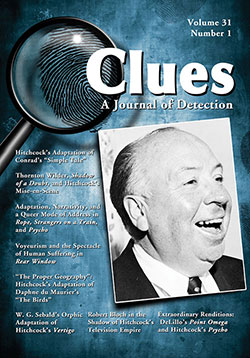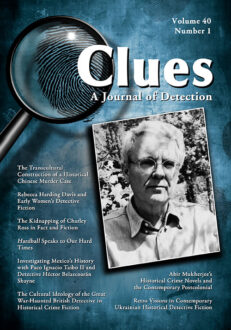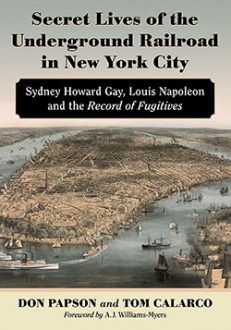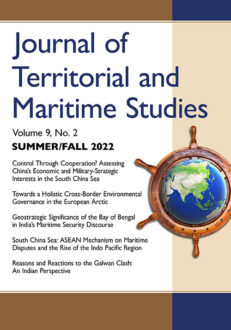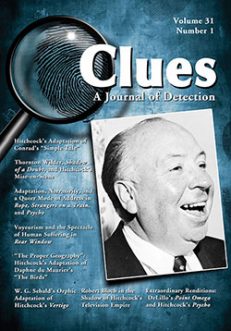Clues: A Journal of Detection, Vol. 31, No. 1 (Spring 2013)
Print Back Issue$30.00
In stock
About the Book
BACK ISSUE
This is a single back issue only. To order a current subscription, or for more information, please visit the journal’s web page at CluesJournal.com. Back issues from earlier volumes of Clues are available for order subject to availability. Also, single issues of the current volume may be ordered one at a time. Individuals may order back issues directly from our online catalog, and the charge for individuals is $30 (excluding postage). Issues from Volume 33 to the present are also available in ebook format on Kindle, Nook and Google Play.
The charge for single issues for institutions is $75 per issue (excluding postage). If your institution requires a back issue, please contact us to order at the appropriate rate.
About the Author(s)
Bibliographic Details
Executive Editor Janice M. Allan
Managing Editor Elizabeth Foxwell
Consulting Editor Margaret Kinsman
Format: softcover (7 x 10), back issue
Pages: 124
Bibliographic Info:
Copyright Date: 2013
ISSN 0742-4248
Imprint: McFarland
Table of Contents
Theme Issue : Hitchcock and Adaptation
Guest Editor: Mark Osteen
Introduction: Hitchcock and Adaptation
Mark Osteen 5
Melancholy Elephants: Hitchcock and Ingenious Adaptation
Ken Mogg 13
Alfred Hitchcock films such as Marnie and Young and Innocent represent a world that is equivocal. Highly ingenious and imaginative, they enable the spectator, much like the character Roger Thornhill in North by Northwest, to re-engage with that world and come “alive.”
“Inspiring Public Uneasiness”: Hitchcock’s Adaptation of Conrad’s “Simple Tale”
Matthew Paul Carlson 24
In Alfred Hitchcock’s Sabotage (1936; adapted from Joseph Conrad’s The Secret Agent, 1907), the director goes beyond mere use of the novel as a point of departure; he deeply engages its underlying anxieties about the artist’s relationship to his audience. The author explores how both Conrad and Hitchcock self-reflexively embed these anxieties within their narratives by developing a series of metaphors for the morally questionable engagement with lowbrow popular culture.
Reading Hitchcock/Reading Queer: Adaptation, Narrativity, and a Queer Mode of Address in Rope, Strangers on a Train, and Psycho
Heath A. Diehl 33
Alfred Hitchcock’s Rope (1948) and Strangers on a Train (1951) reveal an interest in the odd; the peculiar; the “queer.” The author examines the narrative choices made in adaptation, arguing that in the differences between literary texts and cinematic adaptations, Hitchcock facilitates a queer mode of address that encourages audiences to read against the heteronormative imperative that typified mid-century American culture.
“Dear Miss Lonelyhearts”: Voyeurism and the Spectacle of Human Suffering in Rear Window
Nicholas Andrew Miller 45
Rear Window offers a powerful meditation on the ethical implications of private voyeurism in the public sphere. The film draws thematic inspiration from Nathanael West’s Miss Lonelyhearts, appropriating the novella’s title to designate a key minor character and to herald Hitchcock’s trenchant investigation of human suffering and “rear window ethics.”
“The Proper Geography”: Hitchcock’s Adaptation of Daphne du Maurier’s “The Birds”
John Bruns 57
Alfred Hitchcock’s adaptation of Daphne du Maurier’s “The Birds” illuminates the technical aspects of his process of adaptation, much-ignored similarities between du Maurier’s text and Hitchcock’s film, and the anxiogenics of spatial dislocation. The author argues that Hitchcock is preoccupied less with the family romance scripted by Evan Hunter than with the cinematic space of that narrative.
Hitchcock’s Diegetic Imagination: Thornton Wilder, Shadow of a Doubt, and
Hitchcock’s Mise-en-Scène
Donna Kornhaber 67
The author considers the collaboration between Thornton Wilder and Alfred Hitchcock on Shadow of a Doubt (1943) and examines the influence of Wilder’s theories of theatrical abstraction and cinematic realism on Hitchcock’s developing sense of mise-en-scène. Wilder helped Hitchcock employ mise-en-scène as a vital tool of suspense, thus producing a thriller that turned as much on details of properties and setting as on narrative or visual devices.
The Second Look, the Second Death: W. G. Sebald’s Orphic Adaptation of Hitchcock’s Vertigo
R.J.A. Kilbourn 79
This essay compares W. G. Sebald’s novel Vertigo (1991) and Hitchcock’s 1958 film Vertigo. The book extends key themes and formal strategies in the film, most notably Hitchcock’s famous “vertigo shot,” which translates in Sebald into a literary trope for the vertiginous abyss of memory in a modern masculine subject.
Adapting Poe, Adapting Hitchcock: Robert Bloch in the Shadow of Hitchcock’s Television Empire
Dennis R. Perry and Carl H. Sederholm 91
Alfred Hitchcock’s television programs challenged adaptors to transfer his style and persona to the small screen. Robert Bloch invoked his own and Hitchcock’s deep interest in Poe to create episodes that tended to be more dark, ironic, and psychologically edgy than others. Bloch’s teleplays of “A Home Away from Home” and “Annabel” draw from Poe’s dark themes and Hitchcock’s macabre playfulness.
Extraordinary Renditions: DeLillo’s Point Omega and Hitchcock’s Psycho
Mark Osteen 103
Tracing how Don DeLillo’s novella rings changes on the word rendition, the author unravels a skein of intertextual and metacinematic relations that stretches from Psycho to Douglas Gordon’s 24 Hour Psycho video installation, Robert Bloch’s original novel, and the many Psycho remakes; it even includes a film, made by DeLillo’s protagonist, about comedian Jerry Lewis. The author argues that both novel and film force viewers to confront their own complicity with terror and torture.
An Alfred Hitchcock Filmography
Mark Osteen 115
Book REVIEWS
Susan M. Griffin and Alan Nadel, eds. The Men Who Knew Too Much:Henry James and Alfred Hitchcock. Pamela Bedore 117
R. Barton Palmer and David Boyd, eds. Hitchcock at the Source: The Auteur as Adaptor. John Teel 119
Call for Papers: Tana French and Irish Crime Fiction 122
Call for Papers: The Global Crime Scene 123
Author Guidelines are on page 124
Book Reviews & Awards
- “Clues is a must-have for readers and writers of crime fiction. Scholarly, thought-provoking, wide-ranging in its topics, Clues covers the crime and thriller map.”—Sara Paretsky
- “A. Conan Doyle, notoriously resentful of Sherlock Holmes’s success, liked to scorn ‘police romances’ as less significant and worthy of his talents than his other literary work. If he could have read Clues, the thinking mystery reader’s journal, he would surely have felt differently—and learned much he never realized himself about even his own landmark contribution to the genre, from which so much else by others has flowed.”—Jon Lellenberg, U.S. agent for the Arthur Conan Doyle estate
- “I love reading Clues. Every issue provides thought-provoking, well-researched articles. The variety and scope of the material found in Clues makes an unparalleled, ongoing contribution to our understanding of the role of crime fiction in our culture, and the genre’s reflection of its time and society.”—Jan Burke, Edgar-winning author of The Messenger (2009)
- “Clues is an important journal. It carries the torch of tradition that is the backbone of detective fiction. It goes below the surface and gets to the heart of what makes the genre so fascinating and valid today”—Michael Connelly, author of the Harry Bosch novels, including The Overlook (2007)
- “for erudite and fascinating truths about mysteries, follow the clues to Clues, the scholarly journal that is an essential resource for every serious student of the mystery”—Carolyn Hart, author of Death Walked In (2008)
- “with scholarship ranging from Poe to Peters, nothing beats Clues”—Joan Hess, author of Mummy Dearest (2008).

